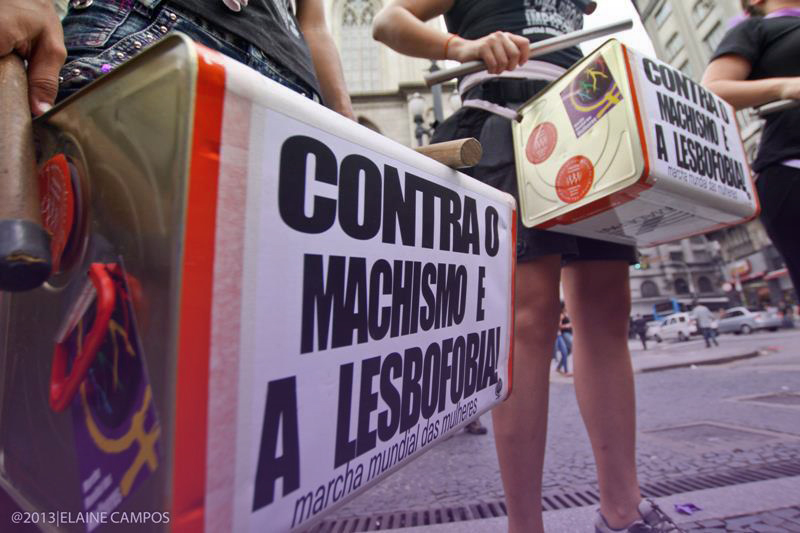International LGBT+ Pride Day is celebrated on June 28th. As feminists and militants of the World March of Women, we celebrate this day bearing in mind that the oppressions women face are not a “sum of parts,” but are rather inseparable. We want to argue that our pride is part of proposed views and actions that are deeply critical, transformative, and radical.
To say that our pride is beyond market fit is to announce that there is no separation between being lesbians, feminists, anti-capitalist, anti-racist. This often means rejecting what has been heralded as LGBT+ pride, especially in June.
We want to advocate for pride not as a product, but as a celebration of forms of life, sexuality, and relationships that disrupt heteropatriarchy. We celebrate it—and demand the right to do so—, but our celebration is, by definition, the opposite of the colorful flags hoisted by big companies, like Pepsico, and the multi-color light shows that do not erase the precarious labor and living conditions promoted by corporations endorsed by states.
We must expose this key role played by corporations in the precarious conditions—in labor and life—that society at large faces around the world, especially people who are on the margins of the capitalist system, which is heteropatriarchal and racist.
We do not want transgenic snacks with rainbow labels; we do not want “genderless” clothes from big chains manufactured by women who are paid nothing in the third world.
Our pride stands in solidarity with the Rana Plaza victims; our pride stands with food sovereignty. We do not want inclusion in this system. We want a new society, a different life.
We therefore reject the corporate attempts to appropriate topics that are important to us. We celebrate our sexualities from the political standpoint of the World March of Women. We advocate for political projects and alternatives by the peoples, with sovereignty and autonomy. Our colors are those of the people who build the grassroots struggle around the world.
We celebrate our pride by rejecting the traps of capitalism and states like the US and Israel, which sell “freedom” while they massacre the people of Palestine and Syria, and others: our pride challenges colonialism and religious fundamentalism.
We celebrate our sexuality and understand it as a political agenda, which is the opposite of views that disregard the material and violent basis of the reality of homosexual people, especially women, around the world—physical violence, as well as symbolic violence, reflected in the lack of rights, invisibility, and stereotypes.
This Pride Week, we also challenge the commodification and medicalization of our malaise. More than a personal matter, more than individual choices, we must question the wicked logic of capitalism that create unreal standards—because none of them is sustainable—to make us feel uncomfortable with our bodies and sexualities, and then sell us individual solutions to heal our pain.
We want a radical change in society, one that disrupts the sexual division of labor based on the traditional family model. One that disrupts the gender binarism, not superficially, but challenging the models that organize this system based on exploitation and stereotypes.
We celebrate and render visible our ways of experiencing our sexualities. We celebrate our lives, because they reflect a political agenda to build alliances and alternatives based on the affection between women, individually and collectively.
As feminists, it is our task to fight the invisibility imposed by heteropatriarchy.
We are part of the LGBT+ struggle, carrying the experiences of grassroots movements. The LGBT+ struggle can only move forward when it pledges to be anti-patriarchal, anti-capitalist, anti-colonial, and anti-racist.

Luiza Mançano and Fabiana Benedito are militants of the World March of Women Brazil. This article was originally published in the WMW Brazil blog in 2021.




